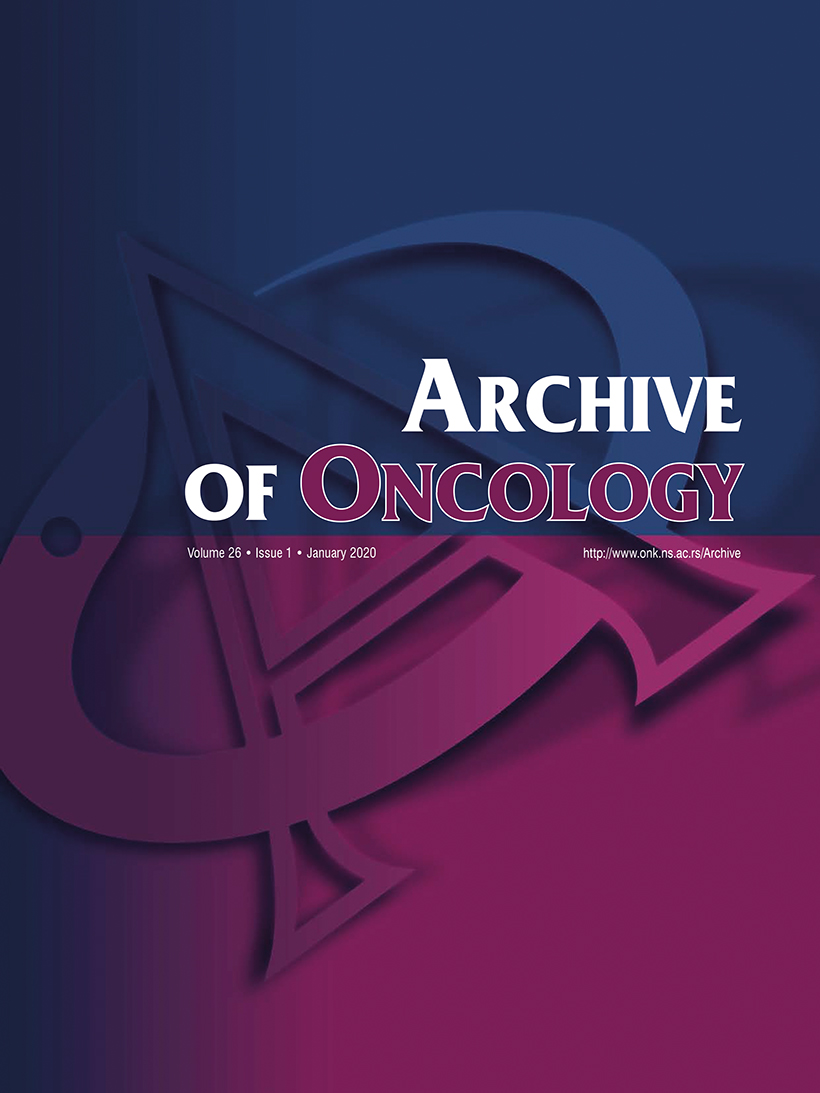Adjuvant application of trastuzumab in HER2 positive breast cancer and impact on time to relapse
Abstract
Background: Of all breast cancers 20-25% are HER2 positive. Overexpression of HER2 protein on the surface of the malignant cell leads to excessive cell proliferation through different signaling pathways. Trastuzumab is a human monoclonal antibody that binds to domain IV of HER2 receptor and blocks signaling pathway for proliferation. The result is an improved prognosis for HER 2 positive breast cancer patients, even when compared to patients with other types of breast cancers. Methods: The study presents 74 women patients with early HER2 positive breast cancer who were previously operated (either radicaly or using breast conserving surgery), and received adjuvant chemo- and radiotherapy. Fourty four patients received adjuvant trastuzumab for one year, and 30 patients did not (control group). Observed time to relapse of the disease was 60 months. Results: There was a significant difference in survival in favor of the group that received trastuzumab (p<0.001). Application of trastuzumab also delayed relapse of the disease by 51.7%. No significant difference was observed between estrogen receptor positive and estrogen receptor negative cancers., In the control group there was a significant difference in relapse free survival in favor of estrogen and progesteron receptor positive tumors (p<0.001). Conclusion: Survival of patients with a HER2 positive breast cancer whose prognosis was initially worse compared to HER2 negative patients, significantly improved after administration of trastuzumab.
References
Jemal A, Thomas A, Murray T, Thun M. Cancer Statistics. CA: A Cancer Journal for Clinicians 2002;52(1):23-47. doi: 10.3322/canjclin.52.1.23
Tyczynski JE, Bray F, Parkin DM. Breast cancer in Europe. ENCR Cancer Fact Sheets 2002;2
Ferlay J, Bray F, Pisani P, Parkin DM. GLOBOCAN 2002: Cancer Incidence, Mortality and prevalence Worldwide , IARC Cancerbase No 5, version 2.0. Lyon, France; IARC Press 2004.
Advisory committee on Cancer Prevention. Recommendations on cancer screening in the European Union. European Journal of Cancer 2000;36(12):1473-1478. doi: 10.1016/s0959-8049(00)00122-2
Cardoso F, Di LA, Lohrisch C, Bernard C, Ferreira F, Piccart MJ. Second and subsequent lines of chemotherapy for metastatic breast cancer: What did we learn in the last two decades. Annals of Oncology 2002;13(2):197-207. doi: 10.1093/annonc/mdf101
Goldhirsch A, Wood WC, Gelber RD, Coates AS, Thürlimann B, Senn H-, et al. . Progress and promise: Highlights of the international expert consensus on the primary therapy of early breast cancer. Annals of Oncology 2007;18(7):1133-1144. doi: 10.1093/annonc/mdm271
Goldhirsch A, Winer EP, Coates AS et al. Personalizing the treatment of women with early breast cancer: highlights of the St Gallen International Expert Consensus on the Primary Therapy of Early Breast Cancer 2013. Ann Oncol 2013; 24: 2206–2223.
Braga S, Dal Lago L, Bernard C, Cardoso F, Piccart M. Use of trastuzumab for the treatment of early stage breast cancer. Expert review of anticancer therapy. 2006;6(8):1153-64.
Gojković Z., Prognostički značaj markera neoangiogeneze kod bolesnica sa karcinomima dojke i uticaj na dužinu vremena do pojave recidiva i udaljenih metastaza, doktorska disertacija, Beograd, 2009: 21-22.
Nagata Y, Lan K, Zhou X, Tan M, Esteva FJ, Sahin AA, Yu D. PTEN activation contributes to tumor inhibition by trastuzumab, and loss of PTEN predicts trastuzumab resistance in patients. Cancer Cell 2004;6(2):117-127. doi: 10.1016/j.ccr.2004.06.022
Delord JP, Allal C, Canal M, Mery E, Rochaix P, Hennebelle I, Canal P. Selective inhibition of HER2 inhibits AKT signal transduction and prolongs disease-free survival in a micrometastasis model of ovarian carcinoma. Annals of Oncology 2005;16(12):1889-1897. doi: 10.1093/annonc/mdi405
Cancer Registry Republic of Srpska, Institut za zaštitu zdravlja Republike Srpske, Banja Luka, 2007.
Slamon D, Pegram M. Rationale for trastuzumab (herceptin) in adjuvant breast cancer trials. Seminars in Oncology 2001;28(1):13-19. doi: 10.1053/sonc.2001.22812
Pivot X, Romieu G, Debled M, Pierga J, Kerbrat P, Bachelot T, et al. . 6 months versus 12 months of adjuvant trastuzumab for patients with HER2-positive early breast cancer (PHARE): A randomised phase 3 trial. The Lancet Oncology 2013;14(8):741-748. doi: 10.1016/s1470-2045(13)70225-0
Slamon D, Eiermann W, Robert N, Pienkowski T, Martin M, Press M, et al. . Adjuvant Trastuzumab in HER2-Positive Breast Cancer. New England Journal of Medicine 2011;365(14):1273-1283. doi: 10.1056/nejmoa0910383
Yin W, Jiang Y, Shen Z, Shao Z, Lu J. Trastuzumab in the Adjuvant Treatment of HER2-Positive Early Breast Cancer Patients: A Meta-Analysis of Published Randomized Controlled Trials. PLoS ONE 2011;6(6) doi: 10.1371/journal.pone.0021030
Piotrowski G, Gawor R, Stasiak A, Gawor Z, Potemski P, Banach M. Cardiac complications associated with trastuzumab in the setting of adjuvant chemotherapy for breast cancer overexpressing human epidermal growth factor receptor type 2: A prospective study. Archives of Medical Science 2012;2:227-235. doi: 10.5114/aoms.2012.28549
Fuqua SA, Schiff R, Parra I, Moore JT, Mohsin SK, Osborne CK, et al. Estrogen receptor β protein in human breast cancer: correlation with clinical tumor parameters. Cancer research. 2003;63(10):2434-9.
Chevallier B, Heintzmann F, Mosseri V, Dauce JP, Bastit P, Graic W, Asselain B. Prognostic value of estrogen and progesterone receptors in operable breast cancer: Results of a univariate and multivariate analysis. Cancer 1988;62(12):2517-2524. doi: 10.1002/1097-0142(19881215)62:12<2517::aid-cncr2820621211>3.0.co;2-9
Gojković Z, Rakita I, Vranješ Ž, Nikolić P et al. Ciljana terapija - mjesto monoklonalnih antitijela u terapiji raka dojke. Savremeni pristup u tretmanu karcinoma dojke, Zbornik radova Akademije nauka i umjetnosti Bosne i Hercegovine, Sarajevo, 2012; 41: 113-133.
De Azambuja E. , Ponde NF, Procter MJ, Rastogi P, Cecchini RS, Ballman KV, Suter TM. Meta-analysis of the cardiac events in the adjuvant trastuzumab trials. Journal of Clinical Oncology 2018;36(15):10066-10066. doi: 10.1200/jco.2018.36.15_suppl.10066
Viani GA, Afonso SL, Stefano EJ, De FLI, Soares FV. Adjuvant trastuzumab in the treatment of her-2-positive early breast cancer: A meta-analysis of published randomized trials. BMC Cancer 2007;7(1) doi: 10.1186/1471-2407-7-153

